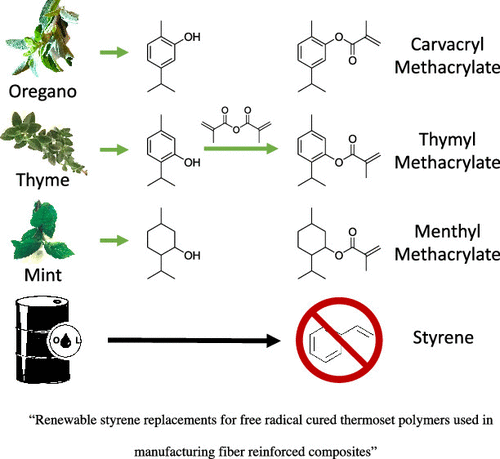当前位置:
X-MOL 学术
›
ACS Sustain. Chem. Eng.
›
论文详情
Our official English website, www.x-mol.net, welcomes your
feedback! (Note: you will need to create a separate account there.)
Synthesis and Characterization of Low-Viscosity Bio-Based Styrene Alternatives for Bisphenol A Vinyl Ester Thermosetting Resins
ACS Sustainable Chemistry & Engineering ( IF 7.1 ) Pub Date : 2020-11-09 , DOI: 10.1021/acssuschemeng.0c06074 John H. Vergara 1 , Santosh K. Yadav 1 , Oluwadamilola Bolarin 1 , John J. La Scala 2 , Giuseppe R. Palmese 1
ACS Sustainable Chemistry & Engineering ( IF 7.1 ) Pub Date : 2020-11-09 , DOI: 10.1021/acssuschemeng.0c06074 John H. Vergara 1 , Santosh K. Yadav 1 , Oluwadamilola Bolarin 1 , John J. La Scala 2 , Giuseppe R. Palmese 1
Affiliation

|
Methacrylated plant oils have been investigated as potential styrene replacements in high-performance thermosetting applications due to the environmental and health hazards presented by styrene. Carvacrol, thymol, and menthol derived from oregano, thyme, and peppermint, respectively, are unique bio-based candidates for methacrylation due to their aromatic and cycloaliphatic structures. When methacrylated, these plant oils exhibited low viscosities—6, 8, and 5 cP for carvacryl methacrylate (CMA), thymyl methacrylate (TMA), and menthyl methacrylate (MMA), respectively. When used as reactive diluents for the diglycidyl ether of bisphenol A (DGEBA)-based vinyl esters (VE), they produced viscosities greater than styrene blends but still within the operating window for standard liquid molding processes. CMA, TMA, and MMA were much less volatile than styrene, each losing less than 5% of its mass over 10 h at 30 °C. Free radical polymerization of VE blends prepared with these plant-based diluents yielded glass-transition temperatures (Tg’s) in the range of 132–150 °C (tan δ). The MMA blend had the highest Tg (150 °C), which was slightly higher than that of the styrene control, and showed an enhanced room temperature modulus (E′RT) of 3.06 GPa. This work demonstrates that CMA, TMA, and MMA are potential candidates to replace styrene as reactive diluent VE systems without sacrificing key aspects of resin performance.
中文翻译:

双酚A乙烯基酯热固性树脂的低粘度生物基苯乙烯替代品的合成与表征
由于苯乙烯对环境和健康的危害,甲基丙烯酸酯植物油已被研究为高性能热固性应用中潜在的苯乙烯替代品。分别来自牛至,百里香和薄荷的香芹酚,百里香酚和薄荷醇由于其芳香和脂环族结构而成为甲基丙烯酸酯化的独特生物基候选物。当甲基丙烯酸酯化时,这些植物油表现出低粘度-甲基丙烯酸carvacryl(CMA),甲基丙烯酸百里酯(TMA)和甲基丙烯酸薄荷酯(MMA)的粘度分别为6、8和5 cP。当用作基于双酚A(DGEBA)的乙烯基酯(VE)的二缩水甘油醚的反应性稀释剂时,它们产生的粘度高于苯乙烯共混物,但仍在标准液体成型工艺的操作范围内。CMA,TMA,和MMA的挥发性要比苯乙烯小得多,在30°C下10h时,它们的质量损失不到5%。用这些基于植物的稀释剂制备的VE共混物的自由基聚合产生玻璃化转变温度(T g是132-150°C(tanδ)的范围。的MMA共混物具有最高的Ť克(150℃),这是比苯乙烯控制的稍高,并表现出增强的室温弹性模量(Ë ' RT 3.06吉帕)。这项工作表明CMA,TMA和MMA可能替代苯乙烯作为反应性稀释剂VE系统,而不会牺牲树脂性能的关键方面。
更新日期:2020-11-23
中文翻译:

双酚A乙烯基酯热固性树脂的低粘度生物基苯乙烯替代品的合成与表征
由于苯乙烯对环境和健康的危害,甲基丙烯酸酯植物油已被研究为高性能热固性应用中潜在的苯乙烯替代品。分别来自牛至,百里香和薄荷的香芹酚,百里香酚和薄荷醇由于其芳香和脂环族结构而成为甲基丙烯酸酯化的独特生物基候选物。当甲基丙烯酸酯化时,这些植物油表现出低粘度-甲基丙烯酸carvacryl(CMA),甲基丙烯酸百里酯(TMA)和甲基丙烯酸薄荷酯(MMA)的粘度分别为6、8和5 cP。当用作基于双酚A(DGEBA)的乙烯基酯(VE)的二缩水甘油醚的反应性稀释剂时,它们产生的粘度高于苯乙烯共混物,但仍在标准液体成型工艺的操作范围内。CMA,TMA,和MMA的挥发性要比苯乙烯小得多,在30°C下10h时,它们的质量损失不到5%。用这些基于植物的稀释剂制备的VE共混物的自由基聚合产生玻璃化转变温度(T g是132-150°C(tanδ)的范围。的MMA共混物具有最高的Ť克(150℃),这是比苯乙烯控制的稍高,并表现出增强的室温弹性模量(Ë ' RT 3.06吉帕)。这项工作表明CMA,TMA和MMA可能替代苯乙烯作为反应性稀释剂VE系统,而不会牺牲树脂性能的关键方面。











































 京公网安备 11010802027423号
京公网安备 11010802027423号